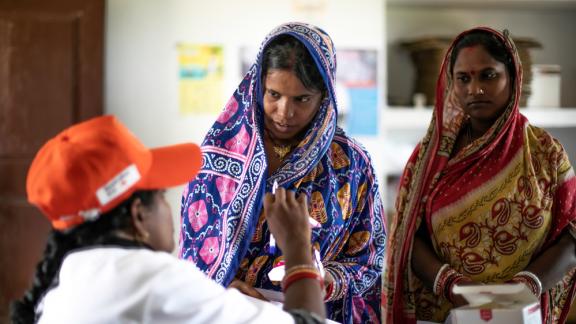1. IPPF SARO welcomes the amendments in India’s Medical Termination of Pregnancy Bill, 2020
The MTP (Amendment) Bill, 2020 passed by the Lok Sabha (Lower House of Parliament) has indeed been a momentous victory for women and girls of India. The celebrations are incomplete without recognizing the tireless efforts of Family Planning Association of India (FPAI) and all the Civil Society partners, activists and women who never stopped demanding women’s rights to safe and legal abortions.
https://www.ippf.org/news/ippf-welcomes-ruling-extend-abortion-care-20-weeks-24-weeks-india
2. COVID-19 pandemic cuts access to sexual and reproductive healthcare for women around the world: IPPF Survey
The COVID-19 pandemic had a major impact on the delivery of sexual and reproductive healthcare around the world. IPPF’s South Asia region saw the largest number of closures overall, with more than 1,872 clinics and other service outlets closed. Read more https://www.ippf.org/news/covid-19-pandemic-cuts-access-sexual-and-reproductive-healthcare-women-around-world
3. COVID-19 and humanitarian response
The impact on public health has been cataclysmic, and we have the utmost gratitude and admiration for our Member Associations who stopped at nothing to carry on delivering vital sexual and reproductive healthcare during this unprecedented year. Read the report https://www.ippfsar.org/resource/narrative-report-business-continuity-fund
4 Big Victory: Nepal Government approved home use of medical abortion services though certified providers ensuring access to safe abortion services during COVID-19
IPPF welcomes the decision of the Ministry of Health (MoH), Nepal to endorse and approve the final MNCH guidelines that allow home-based Medical abortion through outreach model and telemedicine. This is a life-saving decision for many women and girls in need of service but facing the mobility and accessibility-related barriers owing to COVID19. https://www.ippfsar.org/resource/enabling-abortion-services-during-covid-19
5. A new report for ICPD+25: Asia and Pacific analysis
2020 marked a year on from the Nairobi Summit on ICPD+25. Last year’s summit brought together governments, civil society, academia, the private sector, faith-based organizations, international financial institutions, grassroots organizations and other partners interested in the pursuit of sexual and reproductive health and rights.
In South Asia, sub-region six out of the eight governments that belong to this region made a total of 42 commitments. Read the analysis for Asia and Pacific https://www.ippfsar.org/resource/icpd25-nairobi-summit-commitment-analysis-report-asia-pacific-analysis
6. 2020 – but marked the 60th anniversary of the game-changing contraceptive pill
The Pill was the first oral hormonal contraceptive – and the massive impact of this tiny pill cannot be understated.
It allowed women to take real ownership over if and when they had children, and how many they had, giving them control over their lives in a way that had never been seen before. As a by-product, the Pill also enabled its users to make freer choices about other aspects of their lives, such as their careers, education, and sexual habits, and we can see why it remains one of the most popular forms of contraceptive to-date. https://www.ippf.org/blogs/small-mighty-pill-60
7. Webinar on access to Safe Abortion Care in South Asia amid COVID-19: Challenges and Opportunities
IPPF SARO, Asia Safe Abortion Partnership & Guttmacher Institute hosted a webinar to discuss new challenges in access to safe abortion care in South Asia region amid COVID-19. Experts from the region also talked about the innovative approaches to combat its impact and opportunities for the realization of safe abortion care for all. Catch it here https://www.ippfsar.org/news/announcements/webinar-access-safe-abortion-care-south-asia-amid-covid-19-challenges-and
8. Open online course on Minimum Initial Service Package for humanitarian aid workers and volunteers in Iran
IPPF Member Association Family Health Association of Iran signed an MoU with Tehran University of Medical Sciences to develop a massive open online course (accessible to all for free) on Minimum Initial Service Package. The course will help those working in or interested to work in the field of humanitarian aid learn and implement series of crucial actions required to respond to reproductive health needs during a humanitarian crisis. https://twitter.com/ippfsar/status/1318453566785212417
9. World Mental Health Day 2020: In conversation with IPPF Board of Trustee Abhina Aher
IPPF board member and Indian Transgender rights activist Aher Abheena shares her experiences of living with depression, struggles of the community during #COVID19 and commitments needed from organizations for realization of sexual rights and reproductive health for all. Catch it here
10. Healthy, Happy and Hot: A guide to your rights, sexuality & living with HIV
Young people living with HIV may feel that sex is just not an option, but don’t worry – many young people
living with HIV live healthy, fun, happy and sexually fulfilling lives. You can too, if you want to! Things get
easier (and sex can get even better!) as you become more comfortable with your status.
Everyone is entitled to their sexual and reproductive rights, so we released a guide for young people living with HIV. This guide aims to provide people with practical information, so that they can make informed decisions about who, where, when, and how they have sex. Check it out!
when









